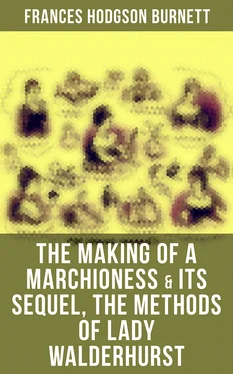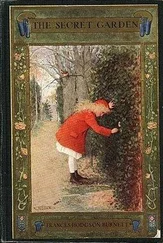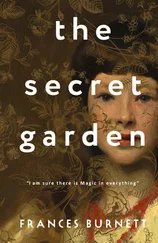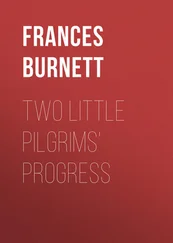“I wonder what Cora is saying,” said Mrs. Brooke to the group at large. “She always makes men laugh so.”
Emily Fox-Seton felt an interest herself, the merriment sounded so attractive. She wondered if perhaps to a man who had been so much run after a girl who took no notice of his presence and amused other men so much might not assume an agreeable aspect.
But he took more notice of Lady Agatha Slade than of any one else that evening. She was placed next to him at dinner, and she really was radiant to look upon in palest green chiffon. She had an exquisite little head, with soft hair piled with wondrous lightness upon it, and her long little neck swayed like the stem of a flower. She was lovely enough to arouse in the beholder’s mind the anticipation of her being silly, but she was not silly at all.
Lady Maria commented upon that fact to Miss Fox-Seton when they met in her bedroom late that night. Lady Maria liked to talk and be talked to for half an hour after the day was over, and Emily Fox-Seton’s admiring interest in all she said she found at once stimulating and soothing. Her Ladyship was an old woman who indulged and inspired herself with an Epicurean wisdom. Though she would not have stupid people about her, she did not always want very clever ones.
“They give me too much exercise,” she said. “The epigrammatic ones keep me always jumping over fences. Besides, I like to make all the epigrams myself.”
Emily Fox-Seton struck a happy mean, and she was a genuine admirer. She was intelligent enough not to spoil the point of an epigram when she repeated it, and she might be relied upon to repeat it and give all the glory to its originator. Lady Maria knew there were people who, hearing your good things, appropriated them without a scruple. Tonight she said a number of good things to Emily in summing up her guests and their characteristics.
“Walderhurst has been to me three times when I made sure that he would not escape without a new marchioness attached to him. I should think he would take one to put an end to the annoyance of dangling unplucked upon the bough. A man in his position, if he has character enough to choose, can prevent even his wife’s being a nuisance. He can give her a good house, hang the family diamonds on her, supply a decent elderly woman as a sort of lady-in-waiting and turn her into the paddock to kick up her heels within the limits of decorum. His own rooms can be sacred to him. He has his clubs and his personal interests. Husbands and wives annoy each other very little in these days. Married life has become comparatively decent.”
“I should think his wife might be very happy,” commented Emily. “He looks very kind.”
“I don’t know whether he is kind or not. It has never been necessary for me to borrow money from him.”
Lady Maria was capable of saying odd things in her refined little drawling voice.
“He’s more respectable than most men of his age. The diamonds are magnificent, and he not only has three superb places, but has money enough to keep them up. Now, there are three aspirants at Mallowe in the present party. Of course you can guess who they are, Emily?”
Emily Fox-Seton almost blushed. She felt a little indelicate.
“Lady Agatha would be very suitable,” she said. “And Mrs. Ralph is very clever, of course. And Miss Brooke is really pretty.”
Lady Maria gave vent to her small chuckle.
“Mrs. Ralph is the kind of woman who means business. She’ll corner Walderhurst and talk literature and roll her eyes at him until he hates her. These writing women, who are intensely pleased with themselves, if they have some good looks into the bargain, believe themselves capable of marrying any one. Mrs. Ralph has fine eyes and rolls them. Walderhurst won’t be ogled. The Brooke girl is sharper than Ralph. She was very sharp this afternoon. She began at once.”
“I—I didn’t see her”—wondering.
“Yes, you did; but you didn’t understand. The tennis, and the laughing with young Heriot on the terrace! She is going to be the piquant young woman who aggravates by indifference, and disdains rank and splendour; the kind of girl who has her innings in novelettes—but not out of them. The successful women are those who know how to toady in the right way and not obviously. Walderhurst has far too good an opinion of himself to be attracted by a girl who is making up to another man: he’s not five-and-twenty.”
Emily Fox-Seton was reminded, in spite of herself, of Mrs. Brooke’s plaint: “Don’t be too indifferent, Cora.” She did not want to recall it exactly, because she thought the Brookes agreeable and would have preferred to think them disinterested. But, after all, she reflected, how natural that a girl who was so pretty should feel that the Marquis of Walderhurst represented prospects. Chiefly, however, she was filled with admiration at Lady Maria’s cleverness.
“How wonderfully you observe everything, Lady Maria!” she exclaimed. “How wonderfully!”
“I have had forty-seven seasons in London. That’s a good many, you know. Forty-seven seasons of débutantes and mothers tend toward enlightenment. Now there is Agatha Slade, poor girl! She’s of a kind I know by heart. With birth and beauty, she is perfectly helpless. Her people are poor enough to be entitled to aid from the Charity Organisation, and they have had the indecency to present themselves with six daughters—six! All with delicate skins and delicate little noses and heavenly eyes. Most men can’t afford them, and they can’t afford most men. As soon as Agatha begins to go off a little, she will have to step aside, if she has not married. The others must be allowed their chance. Agatha has had the advertising of the illustrated papers this season, and she has gone well. In these days a new beauty is advertised like a new soap. They haven’t given them sandwich-men in the streets, but that is about all that has been denied them. But Agatha has not had any special offer, and I know both she and her mother are a little frightened. Alix must come out next season, and they can’t afford frocks for two. Agatha will have to be sent to their place in Ireland, and to be sent to Castle Clare is almost like being sent to the Bastille. She’ll never get out alive. She’ll have to stay there and see herself grow thin instead of slim, and colourless instead of fair. Her little nose will grow sharp, and she will lose her hair by degrees.”
“Oh!” Emily Fox-Seton gave forth sympathetically. “What a pity that would be! I thought—I really thought—Lord Walderhurst seemed to admire her.”
“Oh, every one admires her, for that matter; but if they go no further that will not save her from the Bastille, poor thing. There, Emily; we must go to bed. We have talked enough.”
Table of Contents
To awaken in a still, delicious room, with the summer morning sunshine breaking softly into it through leafy greenness, was a delightful thing to Miss Fox-Seton, who was accustomed to opening her eyes upon four walls covered with cheap paper, to the sound of outside hammerings, and the rattle and heavy roll of wheels. In a building at the back of her bed-sitting-room there lived a man whose occupation, beginning early in the morning, involved banging of a persistent nature.
She awakened to her first day at Mallowe, stretching herself luxuriously, with the smile of a child. She was so thankful for the softness of her lavender-fragrant bed, and so delighted with the lovely freshness of her chintz-hung room. As she lay upon her pillow, she could see the boughs of the trees, and hear the chatter of darting starlings. When her morning tea was brought, it seemed like nectar to her. She was a perfectly healthy woman, with a palate as unspoiled as that of a six-year-old child in the nursery. Her enjoyment of all things was so normal as to be in her day and time an absolute abnormality.
Читать дальше












